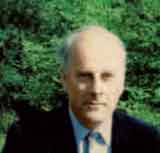| Stapylton Field | Main Board | WW Board | Where? | |||
| home | mus.index | contributors | former staff | editlog | Vic's notes | hot threads |
ONLINE MUSEUM: Derek Fry: obituary from the magazine of Highgate School
 Derek Fry did nothing by halves.
The word 'compromise' was not in his
vocabulary. His pet hates were legion:
political correctness, national and local
governments, health and educational
authorities, the Vernacular Mass, the
European Union and the Euro. Nor had
he any time for the sloppy, the North
London vowel or the glottal stop, the lazy
or those who did not try. Derek Fry did nothing by halves.
The word 'compromise' was not in his
vocabulary. His pet hates were legion:
political correctness, national and local
governments, health and educational
authorities, the Vernacular Mass, the
European Union and the Euro. Nor had
he any time for the sloppy, the North
London vowel or the glottal stop, the lazy
or those who did not try.He was born, auspiciously, on St George's Day, 1933, was a pupil at Franklin House and at Queen Elizabeth's, Barnet where we, and a small group of others, became close friends. We envied his talents: a very gifted linguist, an enthusiastic and skilful pianist, a selftaught violinist, an accomplished actor, and, not surprisingly, a merciless mimic. Ignoring the encouragement of his Head Master whom he revered, he declined to try for Oxford ("too much poetry") and spent possibly the happiest years of his life at St Andrew's, adding Spanish and Italian to his Latin, French and German. | There he threw himself
into Scottish Country Dancing; there,
he, who had nothing more exotic than
Hugenot and, possibly, Welsh blood
in him, acquired an entirely bogus
Scottish accent. A graduate, he returned to Queen Elizabeth's until it became comprehensive. Outraged, he left, and, after several lean years, joined the Common Room at Highgate. As Andrew Race acknowledged (The Cholmeleian, 1991), he was a traditional schoolmaster: loyalty to the community and the welfare of the boys were paramount. Every moment of his long day was fi lled, in addition to a full time-table of French and German, with coaching Spanish, Italian, even Dutch. He ran, by example, the School's Public Service. With concentrated air he played in the School Orchestra and, annually, with Arthur Wallis, enlivened the musical calendar with piano duets in aid of the RNLI, one of several charities he remembered in his Will. He retired from Highgate in 1991, no longer able to take the steps two at a time. As all forms of weakness were anathema and the medical profession high on his list of betes noires, he delayed taking medical advice. The diagnosis was serious. | However, he accepted his retirement
with courage and devoted himself
to his elderly mother, the house,
and his exceptional garden. In 1998, to his utter chagrin, his mother died. His world increasingly began to disintegrate. The house, his garden, his music no longer held his interest, his letters to his friends became sadder and more bitter. In February, 2005 he was found by a neighbour in a deep diabetic coma from which he only fleetingly emerged. He died on 7th June, 2005. Larger than life he certainly was, and yet beneath that carapace of eccentricity there dwelt a loyal, honest, generoushearted friend. Requiescat in pace. Roy Giles |
Sent in by Martyn Day